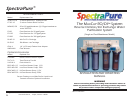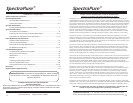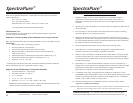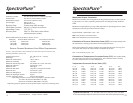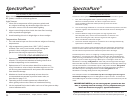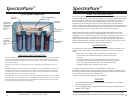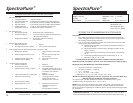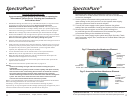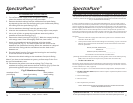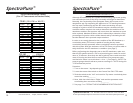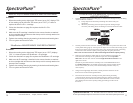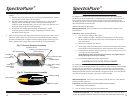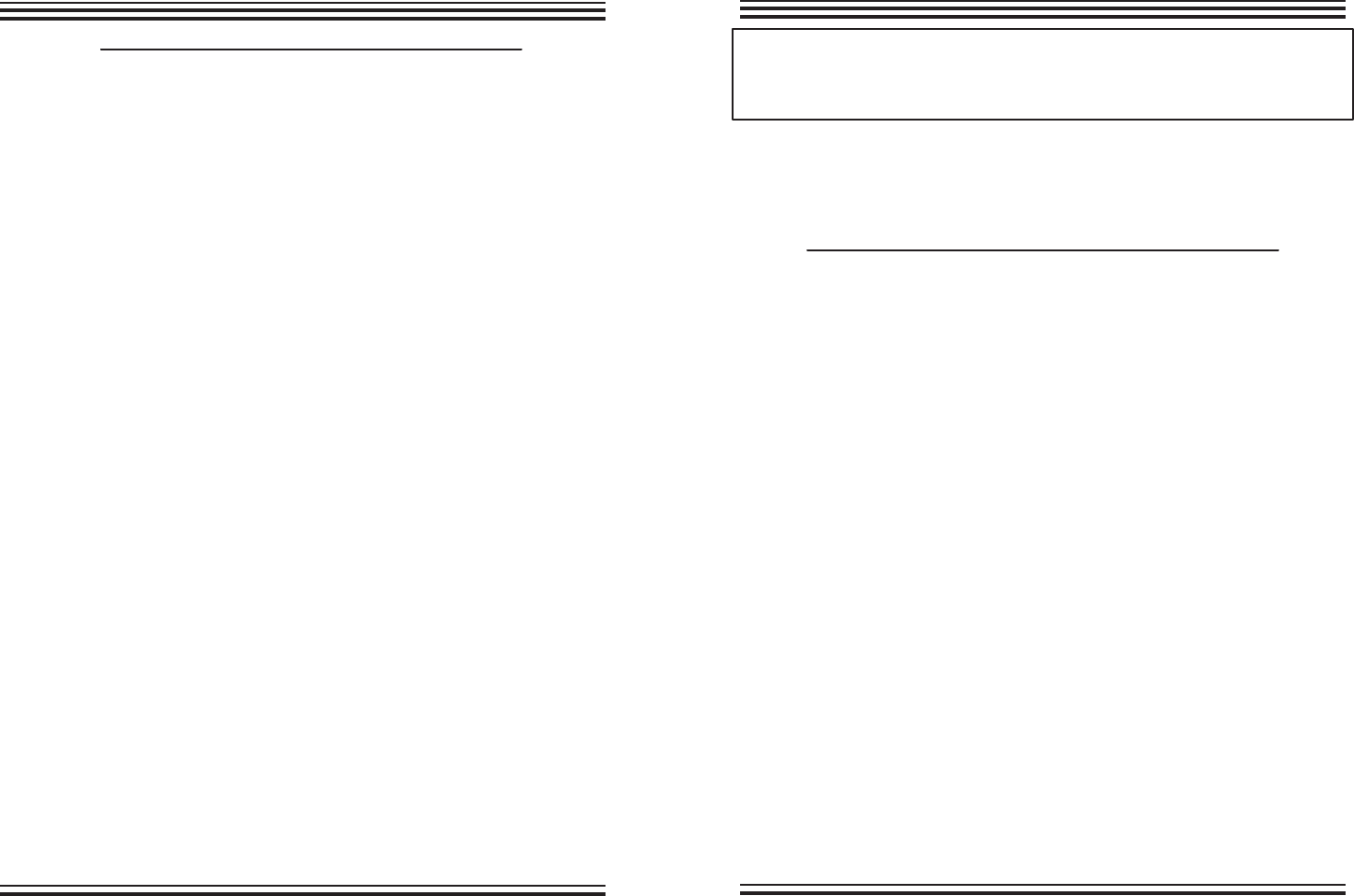
SpectraPure
SpectraPure®Inc.
480.894.5437 Call us toll-free 1.800.685.2783
2167 East Fifth St, Tempe, Arizona 85281
®
18
TROUBLESHOOTING GUIDE FOR RO/DI SYSTEMS
1. Low production rate:
a. plugged pre-filters. i. Replace pre-filters.
b. low water temperature. ii. Heat feed water OR use higher GPD membrane.
c. low line pressure. iii. Use booster pump OR use higher GPD membrane.
d. high TDS content. iv. Use booster pump OR use higher GPD membrane.
e. fouled membrane. v. Clean or replace membrane to restore flux.
f. plugged flow restrictor. vi. Replace flow restrictor & membrane.
2. Zero production rate:
a. Missing flow restrictor. i. Put flow restrictor in the yellow line.
b. Dried RO membrane. ii. Try to restore flux by soaking in rubbing alcohol
OR replace the membrane.
c. Plugged flow restrictor. iii. Replace flow restrictor and replace
the membrane.
3. Extremely high production rate:
a. Ruptured membrane. i. Replace
b. Very high line pressure (> 80 psi). ii. Use a pressure reducing valve.
4. Pressure gauge does not register pressure when the system is “ON”:
a. Missing flow restrictor. i. Put flow restrictor in the yellow
line.
b. Pressure gauge screwed in too far. ii. Unscrew pressure gauge one
turn and retest.
c. Plugged pressure gauge orifice. iii. Clean orifice with a needle.
d. Defective pressure gauge. iv. Replace it.
5. Low deionization cartridge life:
a. Defective membrane. i. Replace it.
b. Low pressure (< 40 psi). ii. Use booster pump.
c. High CO2 levels in water (> 5 ppm). iii. Aerate RO product water or use a
straight anion cartridge ahead of
DI cartridge. (Call Technical
Support)
d. High TDS in feed water (> 1000 ppm). iv. NO EASY SOLUTION.
e. High levels of silica, nitrates, v. Use straight anion cartridge
ahead of mixed-bed for
phosphates etc. in tap water.
f. Bad or faulty DI cartridge.
g. High pH tap water (> 9.0). vi. Acidify feed water to the RO
membrane to improve its
rejection.
h. Faulty monitor/probe. Test and Replace if required.
SpectraPure®Inc
. Fax 480.894.6109 Fax us toll-free 1.877.527.7873
E-mail: spectra@spectrapure.com Visit us on the web www.spectrapure.com
7
SpectraPure
®
TESTING THE RO MEMBRANE REJECTION RATE
Procedure:
1. First, make sure that the system has been turned on and producing
water (filling the tank) for 15-20 minutes. (The pressure gauge should
be reading > 40-PSI during this time).
2. Turn on the meter by depressing the “ON” switch then locate the slide
switch on the front of the meter.
A. Measure the tap water conductivity by sliding the switch to
the Left. (Call it X)
B. Measure RO water conductivity by sliding the switch to the
Right. (Call it Y).
C. Subtract RO water conductivity from tap water conductivity.
(X - Y)
D. Divide this quantity by tap water conductivity. (X - Y) ÷ X
E. Rejection = [(X - Y) ÷ X ] ×100
* Conductivity in the above procedure could be caused by hardness,
alkalinity,nitrate, phosphate, silica etc. (The measurement is in ppm or mg/l).
Rejection of the RO Membrane Calculation Example
1. Tap water hardness = 150 ppm (X)
2. RO water hardness = 7 ppm (Y)
3. X - Y = 143 ppm
4. (X - Y) ÷ X = 143 ÷ 150 = 0.953
5. Rejection = [ ( X - Y) ÷ X ] ×100 = 0.953 ×100 = 95.3
Membrane Hardness Rejection = 95.3 % : Rejection rates less than 95% may
indicate that the membrane should be replaced.
As a general rule; the RO membrane would be considered to be in good
condition when the rejection rate is = to or > 95%.
NOTE: There are many variables in the input (Tap) water chemistry that may
affect the rejection rate of the RO membrane. (If, after testing the membrane,
there are questions regarding its condition, please call our Technical Support staff
for assistance).
For service or repair of these monitors, please send to:
HM DIGITAL, INC
5819 Uplander Way
Culver City, CA 90230
DM-1 Specifications:
Range 0-1999 PPM Resolution 1PPM (1-999 PPM)
Accuracy 2% Probe ¼’’
Power Source (2) 1.5V button batteries Battery life Approx 1000 hours



